
STORY HIGHLIGHTS
- Hassan Rouhani succeeds Mahmoud Ahmadinejad as president
- He promises greater personal freedoms without threatening Iran’s supreme leader
- Israeli prime minister: The world shouldn’t let up on sanctions for Iran’s nuclear program
- “It’s not democracy as we know it,” Britain’s prime minister says of the Iranian election
Tehran (CNN) — Iranian centrist candidate Hassan Rouhani has won the country’s presidential election, a victory that garnered both congratulations and skepticism around the world.
Rouhani spoke of reforms without threatening Iran’s supreme leader, Ayatollah Ali Khamenei, or the country’s institutions — of which he is product. The former national security council chief promised greater personal freedoms and indicated he would free political prisoners and jailed journalists.
He takes the helm as Iran deals with sharp economic sanctions tied to international concern about its nuclear program.
On Sunday, Israeli Prime Minister Benjamin Netanyahu cautioned the world against easing such sanctions.
“Regarding the results of the elections in Iran, let us not delude ourselves. The international community must not become caught up in wishes and be tempted to relax the pressure on Iran to stop its nuclear program,” Netanyahu said at a weekly Cabinet meeting.
The prime minister also said Iran’s supreme leader “disqualified candidates who did not fit his extremist outlook.”
Read more: Rouhani, hawk or dove?
In his campaigning, Rouhani pledged to improve the economy and unemployment. As a former nuclear negotiator, he said he would reduce the high tension between Iran and the outside world by addressing the sanctions.
In a message through the semiofficial Fars News Agency, the 65-year-old Rouhani said the win “is the victory of wisdom, moderation, growth and awareness, the victory of commitment and religiosity over extremism and ill tempers.”
Global reactions
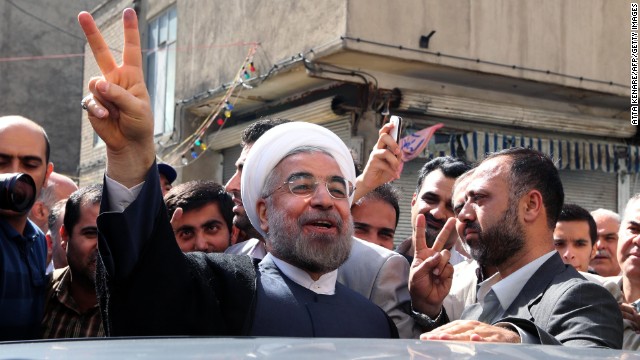 Newly elected president Hassan Rouhani leaves a polling station after voting in Tehran on Friday, June 14. Some 50 million Iranian voters were eligible to go to the polls to select a new president from a field of six candidates.
Newly elected president Hassan Rouhani leaves a polling station after voting in Tehran on Friday, June 14. Some 50 million Iranian voters were eligible to go to the polls to select a new president from a field of six candidates. Iran’s presidential election
Iran’s presidential election
Iran’s presidential election
Iran’s presidential election
Iran’s presidential election
Iran’s presidential election
Iran’s presidential election
Iran’s presidential election
Iran’s presidential election
Iran’s presidential election
Iran’s presidential election
Iran’s presidential election
Iran’s presidential election
Iran’s presidential election
Iran’s presidential election
Iran’s presidential election
Iran’s presidential election
Iran’s presidential election
Iran’s presidential election
Iran’s presidential election
Iran’s presidential election
HIDE CAPTION
<<
<</span>
>
>>
 Photos: Iran’s presidential election
Photos: Iran’s presidential election 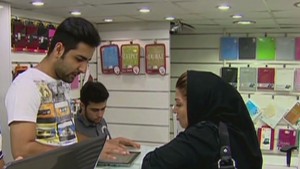 Impact of sanctions on Iranians
Impact of sanctions on Iranians
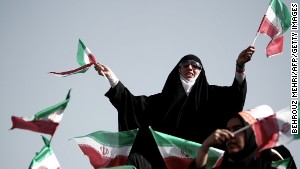 Iran elections: Why 2013 isn’t like 2009
Iran elections: Why 2013 isn’t like 2009
 Erin Burnett’s experiences in Iran
Erin Burnett’s experiences in Iran
The British Foreign Office immediately urged Rouhani to help steer Iran in a new direction.
“We call on him to use the opportunity to set Iran on a different course for the future: addressing international concerns about Iran’s nuclear program, taking forward a constructive relationship with the international community, and improving the political and human rights situation for the people of Iran,” a Foreign Office spokesman said.
The United States “remains ready to engage the Iranian government directly in order to reach a diplomatic solution that will fully address the international community’s concerns about Iran’s nuclear program,” the White House said.
Read more: Will Iran shift policy on Syria?
While the White House respected the vote, it said the election occurred “against the backdrop of a lack of transparency, censorship of the media, Internet, and text messages, and an intimidating security environment that limited freedom of expression and assembly.”
U.N. Secretary-General Ban Ki-moon offered his congratulations and called on Iran to take a “constructive role in regional and international affairs.”.
Following Ahmadinejad
Rouhani succeeds outgoing President Mahmoud Ahmadinejad, who was term-limited and could not run in the election.
But Rouhani won’t be Iran’s most powerful man. That distinction belongs to Ayatollah Ali Khamenei, who has been Iran’s supreme leader since 1989. He’s got plenty of backing, from conservative citizens to loyalist militia groups to, most notably, the Revolutionary Guard.
On his website, the supreme leader said Rouhani is the president of all Iranians and told supporters of various candidates to set aside their differences and unify.
Rouhani has all-round credentials in Iran’s institutions that include senior cleric, former commander of Iranian air defenses and is an intellectual with three law degrees, including from a university in Scotland.
Read more: The view from Tehran
He has a reputation for shunning extreme positions and bridging differences.
While he has represented Khamenei on Iran’s security council since 1989, he has avoided being perceived as a pushover and has taken exception with the supreme leader on being too rigid toward the international community, according to an Iranian scholar at Stanford University.
Rouhani has accused state-run media of censorship and publishing lies.
‘Not a democracy as we know it’
Prior to the results, British Prime Minister David Cameron said the Iranian election system doesn’t resemble a true democracy.
“We have to remember this is always only an election between a restricted number of candidates. It’s not democracy as we know it,” he told CNN’s Richard Quest.
Iran’s Guardian Council, an unelected body made up of six clerics and six lawyers operating under the oversight of the supreme leader, drew up the restricted list of candidates from the 680 who initially registered.
Read more: What’s at stake in election?
Eight candidates were approved, two of whom subsequently dropped out.
The final six contenders didn’t include any women. Nor did they include Ahmadinejad’s aide and protege Esfandiar Rahim Mashaei, who was among those excluded by the Guardian Council.
The only cleric among the candidates, he has close ties to Khamenei and served in Iran’s parliament for two decades. He was also Iran’s lead nuclear negotiator from 2003 to 2005 and holds seats on several powerful decision-making bodies.
Remembering the 2009 chaos
Four years ago, when allegations of election fraud sparked widespread protests, Iran’s police and the Basij, a feared paramilitary group, cracked down on the opposition Green Movement.
Protesters were jailed, and human rights groups alleged many were tortured and killed behind bars while the government quashed the uprising.
Reform politicians representing the movement, including Ahmadinejad’s election rival, former Prime Minister Mir Hossein Moussavi, have been under house arrest since 2011.
Despite the unrest, Ahmadinejad’s re-election was formally certified by the clerical establishment.
CNN’s Shirzad Bozorgmehr reported from Tehran and Michael Martinez reported and wrote from Los Angeles. CNN’s Holly Yan, Michael Schwartz, Laura Smith-Spark, Reza Sayah, Azadeh Ansari and Sara Mazloumsaki contributed to this report.
Read the article:
Centrist Rouhani wins Iranian vote
via Arne Ruhnau News http://arneruhnau.com/centrist-rouhani-wins-iranian-vote/
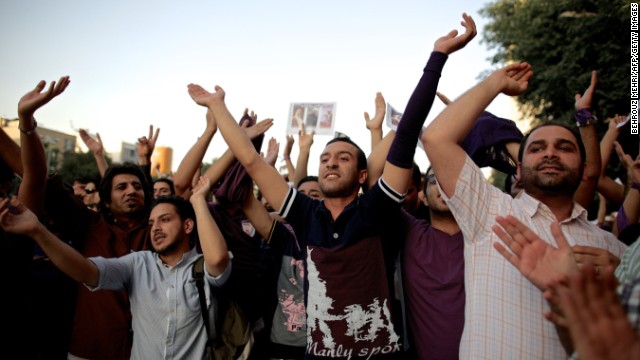 Supporters of Rouhani celebrate his victory in downtown Tehran on Saturday, June 15.
Supporters of Rouhani celebrate his victory in downtown Tehran on Saturday, June 15. 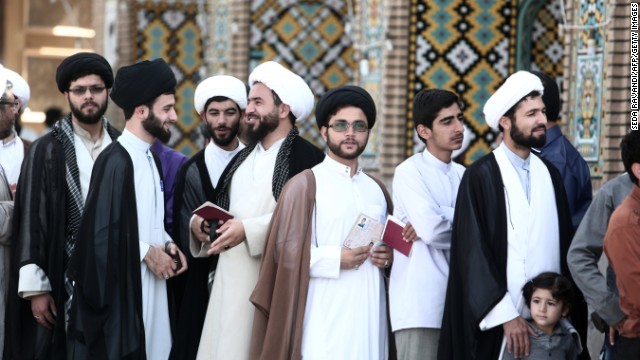 Iranian men wait to vote at a polling station at the Massoumeh shrine in the holy city of Qom, south of Tehran, during presidential elections on June 14.
Iranian men wait to vote at a polling station at the Massoumeh shrine in the holy city of Qom, south of Tehran, during presidential elections on June 14. 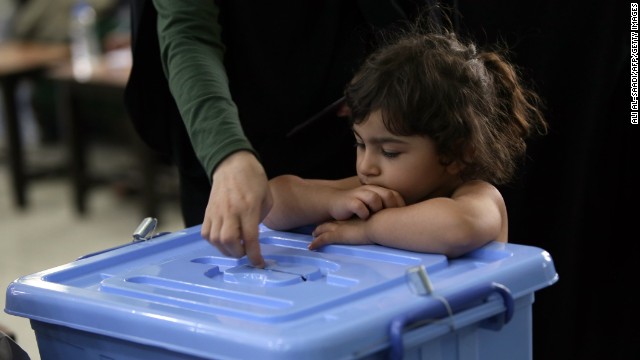 A girl looks at an Iranian national casting her ballot as she votes on June 14.
A girl looks at an Iranian national casting her ballot as she votes on June 14. 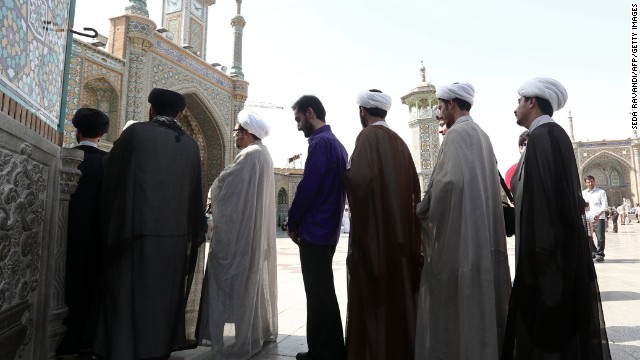 Iranian clergymen wait in line to vote at a polling station at the Massoumeh shrine on June 14.
Iranian clergymen wait in line to vote at a polling station at the Massoumeh shrine on June 14. 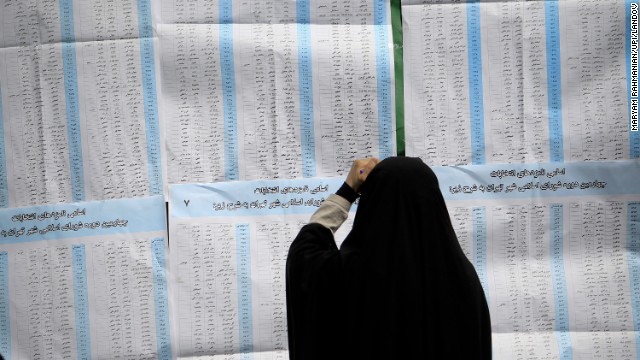 A woman checks out her ballot before voting in Iran’s presidential elections at a Tehran polling station on Friday, June 14.
A woman checks out her ballot before voting in Iran’s presidential elections at a Tehran polling station on Friday, June 14. 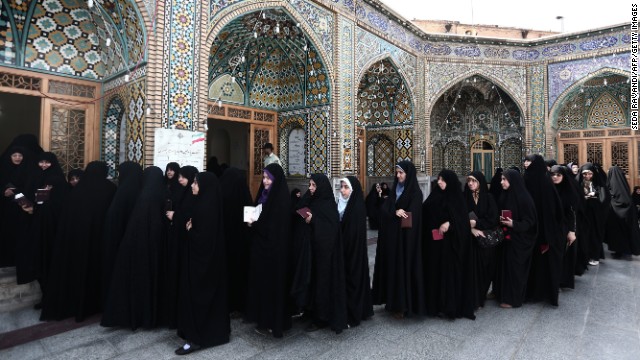 Women wait in line to vote at a shrine in Qom on June 14.
Women wait in line to vote at a shrine in Qom on June 14. 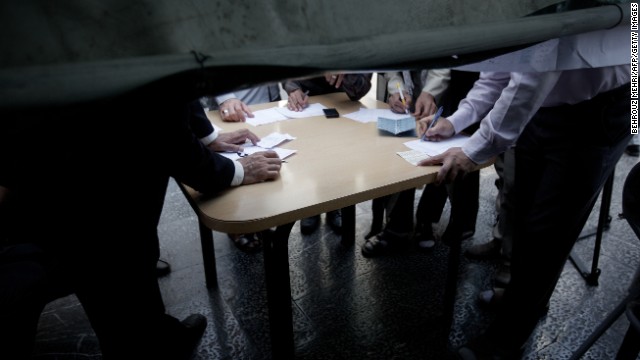 Voters fill out paper ballots in Tehran on June 14.
Voters fill out paper ballots in Tehran on June 14. 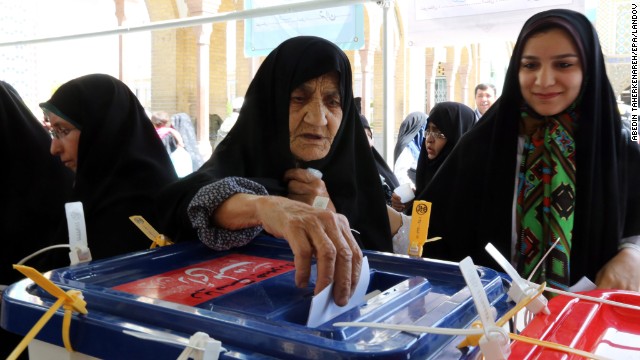 A woman casts her ballot during the Iranian presidential elections in Shahr-e-Rey on June 14.
A woman casts her ballot during the Iranian presidential elections in Shahr-e-Rey on June 14. 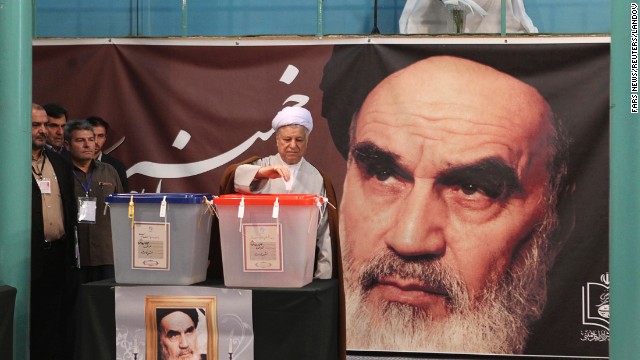 Former Iranian President Akbar Hashemi Rafsanjani votes in the Jamaran mosque in Tehran on June 14.
Former Iranian President Akbar Hashemi Rafsanjani votes in the Jamaran mosque in Tehran on June 14. 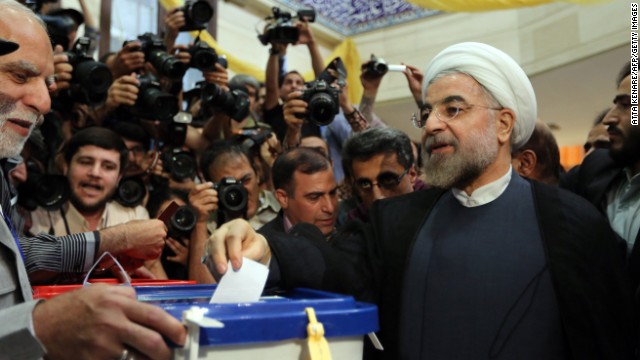 Presidential candidate Hassan Rouhani casts his vote in Tehran on June 14.
Presidential candidate Hassan Rouhani casts his vote in Tehran on June 14. 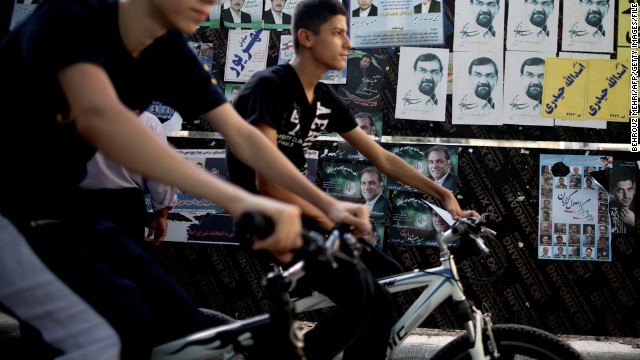 Youths ride past campaign posters in downtown Tehran on Thursday, June 13, a day ahead of the country’s presidential election.
Youths ride past campaign posters in downtown Tehran on Thursday, June 13, a day ahead of the country’s presidential election. 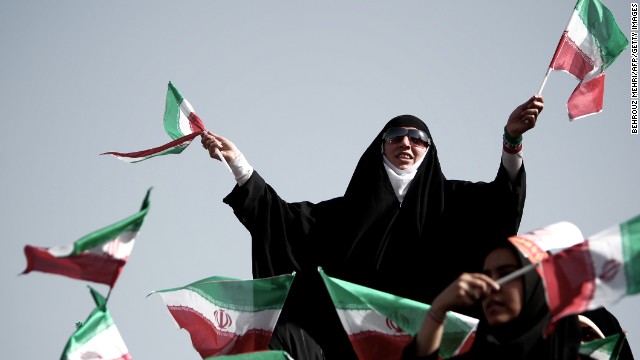 Supporters of top nuclear negotiator and conservative presidential candidate Saeed Jalili wave national flags during his campaign rally at Heydarnia stadium in Tehran on Wednesday, June 12.
Supporters of top nuclear negotiator and conservative presidential candidate Saeed Jalili wave national flags during his campaign rally at Heydarnia stadium in Tehran on Wednesday, June 12. 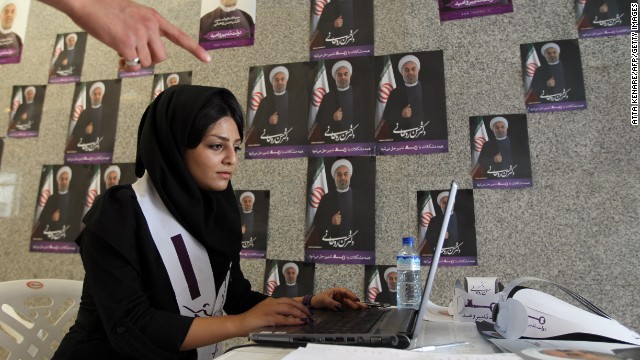 A supporter of Hassan Rouhani, moderate presidential candidate and former top nuclear negotiator, works on her laptop in one of his campaign offices in Tehran on Tuesday, June 11.
A supporter of Hassan Rouhani, moderate presidential candidate and former top nuclear negotiator, works on her laptop in one of his campaign offices in Tehran on Tuesday, June 11. 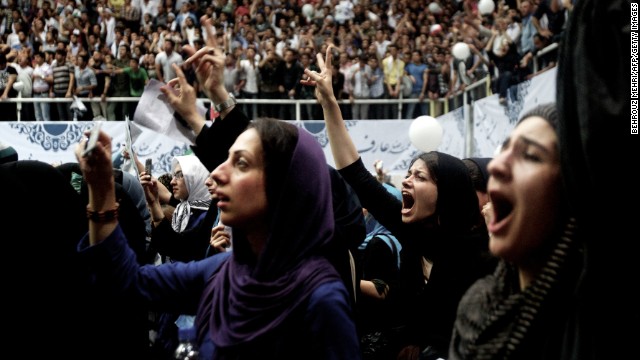 Iranian supporters of former vice president and reformist presidential candidate Mohammad Reza Aref shout slogans during his campaign rally in Tehran on Monday, June 10. Later on Monday he announced his decision to drop out of the race. Hours earlier, another candidate, Gholam-Ali Haddad-Adel, also said he was out.
Iranian supporters of former vice president and reformist presidential candidate Mohammad Reza Aref shout slogans during his campaign rally in Tehran on Monday, June 10. Later on Monday he announced his decision to drop out of the race. Hours earlier, another candidate, Gholam-Ali Haddad-Adel, also said he was out. 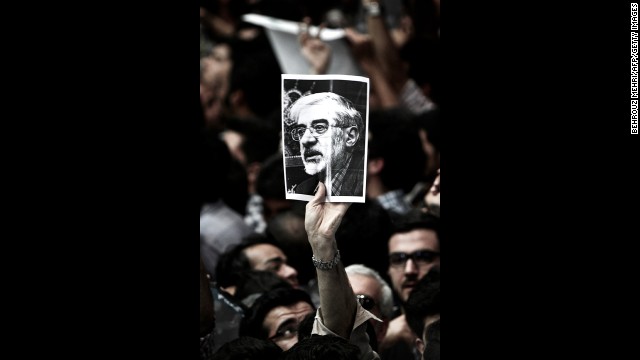 A man holds a portrait of opposition leader Mir Hossein Mousavi, who has been under house arrest since February 2011, during a campaign rally for Aref in Tehran on June 10.
A man holds a portrait of opposition leader Mir Hossein Mousavi, who has been under house arrest since February 2011, during a campaign rally for Aref in Tehran on June 10. 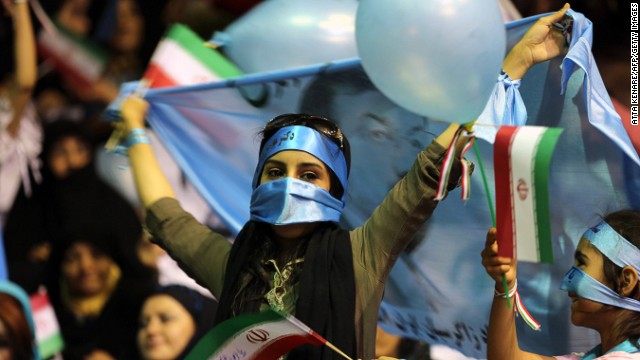 A supporter of Iranian presidential candidate Mohsen Rezaei, Iran’s top commander during the war with Iraq, holds a blue flag bearing his portrait during a rally in Tehran on June 10.
A supporter of Iranian presidential candidate Mohsen Rezaei, Iran’s top commander during the war with Iraq, holds a blue flag bearing his portrait during a rally in Tehran on June 10. 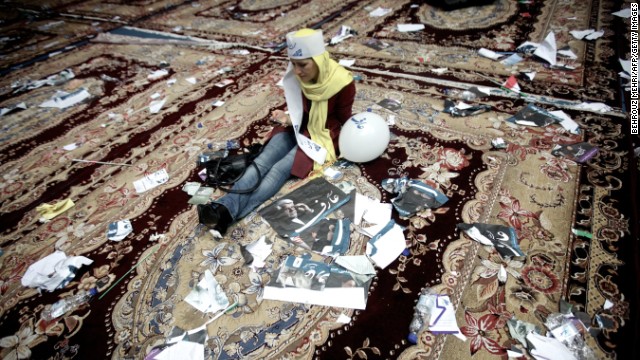 An Aref supporter checks her mobile phone surrounded by campaign posters after the June 10 rally in Tehran.
An Aref supporter checks her mobile phone surrounded by campaign posters after the June 10 rally in Tehran. 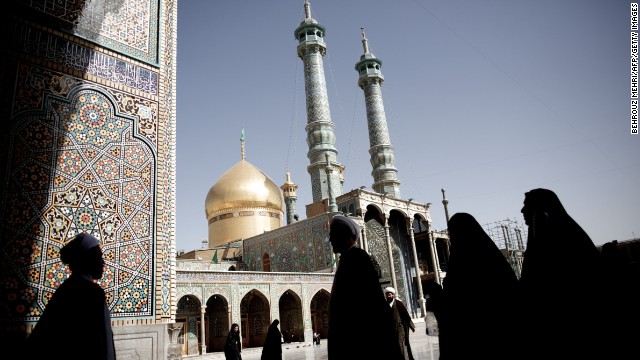 Pilgrims and clergymen walk across the courtyard of the Masoumeh holy shrine in the religious Shiite Muslim city of Qom on Sunday, June 9. Iran’s powerful bazaar merchants and Shiite clergy spearheaded the 1979 Islamic revolution, but their role in the country’s political scene has waned over the years, analysts say.
Pilgrims and clergymen walk across the courtyard of the Masoumeh holy shrine in the religious Shiite Muslim city of Qom on Sunday, June 9. Iran’s powerful bazaar merchants and Shiite clergy spearheaded the 1979 Islamic revolution, but their role in the country’s political scene has waned over the years, analysts say. 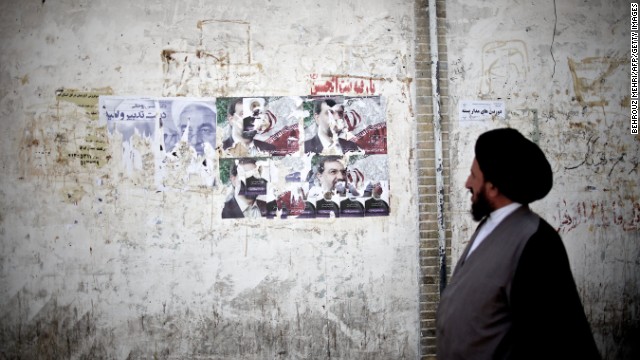 An Iranian clergyman walks past campaign posters on June 9 in Qom, south of the capital city of Tehran.
An Iranian clergyman walks past campaign posters on June 9 in Qom, south of the capital city of Tehran. 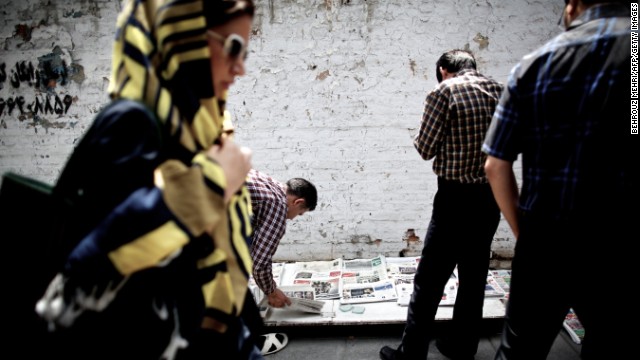 Iranians read the headlines on the front pages of newspapers unveiling the approved presidential candidates on May 22 in Tehran.
Iranians read the headlines on the front pages of newspapers unveiling the approved presidential candidates on May 22 in Tehran. 




















No comments:
Post a Comment